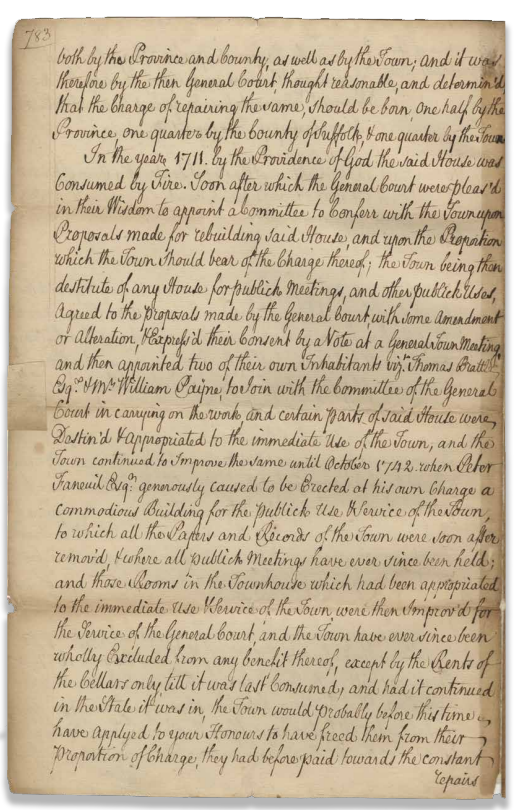The captains of slave ships were often disreputable men while owners enjoyed the deference accorded to wealth.
“The topiniest merchant in all the town.”
- Merchant Thomas Hancock describing Peter Faneuil
”
Traces of the Trade: Bricks and Mortar
Massachusetts has some surprising connections to the slave trade. Faneuil Hall,
the “cradle of liberty” was first developed
by Peter Faneil, one of Boston’s wealthiest merchants whose fortune derived in
part from the slave trade. Cornelius Waldo,
great grandfather of Ralph Waldo Emerson,
was an active trader. One of his vessels was
named Africa. In early years the McLean
Hospital and Massachusetts General Hospital were supported in part by funds from
the West India activities of the McLeanAmory families
Faneuil Hall . . .

Peter Faneuil's Letter . . .
The Jolly Bachelor
Peter Faneuil, benefactor of Faneuil Hall,
inherited a fortune from his uncle on the
condition that he would never marry. His
ship, Jolly Bachelor, made a slaving voyage
to Sierra Leone. On March 2, 1742 captive slaves revolted, killing the captain and
two crew members. They also destroyed
the mast and rigging. Another European merchant recovered the ship, refitted it, and bought back twenty of the
escaped slaves from African captors.
Faneuil died before the ship’s return
to America.
- Rulers and Leaders
Insurrection on board a Slave Ship . . .
SLAVE SHIPS
Jolly Bachelor, Rainbow, and Gift of
God, seem like inappropriate names for
slave ships. All had Massachusetts
connections
THOMAS HANDASYD PERKINS
- by Thomas Sully
Perhaps Boston’s most prominent nineteenth century philanthropist, Perkins began a slave trading operation in present day Haiti, but fled after a slave revolt. He is best known for his role in selling furs, gold, silver, and Turkish opium in China. His charitable activities ranged from supporting construction of the Bunker Hill Monument to founding a school for the blind.
